History of the Association
Hinter dem Studentenwohnheim Geschwister Scholl e.V. steht der 1956 gegründete, gleichnamige Verein (Studentenwohnheim Geschwister Scholl e.V.). Er ist Eigentümer des Wohnheims und verwaltet es seit dessen Eröffnung 1960.
History of the Association
The association "Studentenwohnheim Geschwister Scholl e.V." was founded in 1956 and owns the student dormitory Geschwister Scholl. The association has been managing the dormitory since its opening in 1960.
The Initial Situation (1946 to 1956)
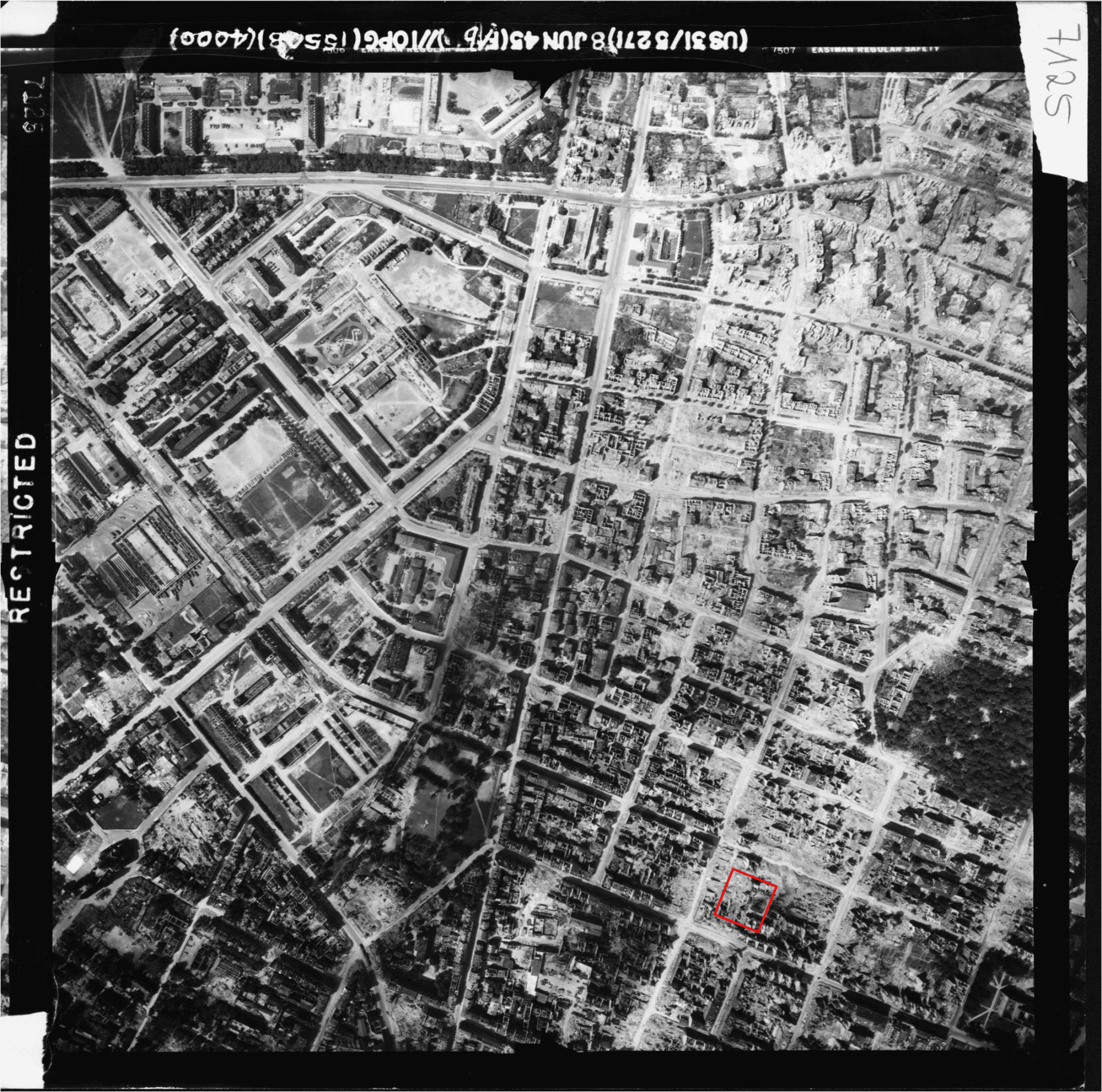
An aerial photograph from the Schwere Reiter Straße area in 1945, the plot of the Schollheim is marked in red. Source: StaMü FS-1945-7125.
After World War II, 50% of the buildings in the city of Munich were destroyed. Consequently, around 300,000 people were left homeless. When the Technical University (TUM) resumed classes in April 1946, followed by the Ludwig Maximilian University (LMU) in June 1946, the urgent need wasn’t the construction of student dormitories. The more pressing concern was the creation of housing in general to alleviate the dire housing crisis. To achieve this goal, allocation guidelines for social housing excluded renting rooms to students. However, the number of students increased at both universities; by 1949, there were approximately 15,000 students. The rising number of students further exacerbated the housing shortage in Munich. By the early 1950s, the situation had worsened. Given that the provision of accommodation for students was not a priority in housing policy due to the overall housing crisis, improving the situation was only possible through private initiatives.
The founding of the Association (1956)
Back then, as it is today, children from less affluent families should have the opportunity to attend university. This required, and still requires, the availability of affordable housing.
To create this, on June 13, 1956, in a side room of Café Odeon at Munich’s Odeonsplatz, the non-profit association “Studentenwohnheim Geschwister Scholl e.V.” was founded. The sole objective of the association’s statutes was the construction and maintenance of a student dormitory.
The idea for building a student dormitory originated within the Association of Social Democratic Academics. The suggestion to form an association came from Dr. Hans-Jochen Vogel, a member of the SPD (Social Democratic Party) and the Socialist German Student Union (SDS). At the time, the 30-year-old Vogel was a magistrate and worked in the State Chancellery of Bavarian Minister President Dr. Wilhelm Hoegner, later becoming the Mayor of Munich and Federal Minister of Justice. Through the association and private connections, Vogel managed to enlist the support of three individuals for the plan to build a student dormitory:
- The dermatologist and Rector of LMU, Dr. Alfred Marchionini,
- Fritz Koch, Bavarian Minister of Justice, and
- Adolf Eugen Samstag, Board Member of the former Bavarian Mortgage and Exchange Bank.
28 individuals responded to the invitation from the committee led by Alfred Marchionini, including politicians, professors, entrepreneurs, unionists, bankers, publishers, writers, journalists, and senior officials. Many of them were prominent opponents and victims of National Socialism, most due to their social democratic involvement, hiding Jews, or assisting them in escaping. They represent the “other” Germany around the time of World War II.
At the founding of the association, the following positions were elected:
- as Chairman: Prof. Dr. Alfred Marchionini (as mentioned above),
- as his Deputy: Minister Dr. Fritz Koch (as mentioned above),
- as Members of the Board: Adolf Eugen Samstag (as mentioned above) and Erwin Essl, Member of the State Parliament and District Manager of IG Metall Bavaria, also Chairman of the Socialist Workers’ Youth in Schweinfurt until 1933,
- as Managing Director: Dr. Hans-Jochen Vogel (as mentioned above).
The patron of the association was the Bavarian Prime Minister Dr. Wilhelm Hoegner (as mentioned above).
The assembly decided to appoint an additional Member of the Board through co-option to balance out the dominance of Social Democratic association members in the executive board.
This position was filled by:
- Dr. Rolf Rodenstock, President of the Bavarian Employers’ Association and member of the Federation of German Industries.
Below: Photogallery of the leading founding members
Among other founding members were:
- Karlheinz Lange, the editor-in-chief of the Bayerischen Staatszeitung,
- the publisher Kurt Desch,
- Hans-Werner Richter, a writer, founder of the “Gruppe 47“, and a member of a socialist resistance group during the Nazi era,
- Edmund Goldschagg, the political editor of the social-democratic newspaper “Münchener Post” and co-founder and first editor-in-chief of the “Süddeutschen Zeitung“,
- Dr. Alexander Schenk Graf von Stauffenberg, historian and elder brother of Claus Schenk Graf von Stauffenberg, who attempted to assassinate Adolf Hitler on July 20, 1944,
- Rudolf Zorn, a state minister and director of the Bavarian Savings Banks and Giro Association,
- Ludwig Koch, chairman of the German Trade Union Confederation in Munich,
- Burghard Freudenfeld, a publicist,
- Robert Jenisch, a student, who later later became a lawyer and managing director of the association.
It’s noteworthy that many of the association and board members had personal connections with each other:
Wilhelm Hoegner and the father of the Scholl siblings, Robert Scholl, knew each other personally. They lived in the same street and developed a friendship, with their families frequently visiting each other..
Alfred Marchionini was a friend and supporter of Hans-Jochen Vogel, who, in turn, knew the Justice Minister Koch well from his work starting in 1952 as an assessor in the Ministry of Justice and the Bavarian State Chancellery. The editor-in-chief of the Bavarian Staatszeitung, Dr. Karl-Heinz Lange, was also part of Vogel’s circle of friends.
Finding a Name (1956)
Besides alleviating the housing shortage for students, there was another motive behind the construction of a student dormitory. The then Bavarian SPD chairman and deputy federal chairman, Waldemar von Knoeringen, aimed to transform the SPD from a class-based party into a people’s party by making it electable for academics among other strategies. The Working Group of Social Democratic Academics considered the idea of establishing a student dormitory that would advocate for the SPD and inspire young people, future academics, to embrace social democracy.
This notion was pivotal in naming it “Geschwister Scholl” (Scholl Siblings): By evoking the memory of two courageous young individuals who sacrificed their lives for freedom and democracy, the current generation of students was meant to be motivated to engage with the values of democracy and the constitution. Therefore, the Working Group sought contact with Robert Scholl, the father of the Scholl siblings, and received his approval for the naming. This decision was likely further supported by the friendship that the patron Hoegner shared with Robert Scholl.
Opening of House 1 and Unveiling of the Monument (1956 to 1960)
The Chairman of the Association, Alfred Marchionini, along with other prominent supporters, managed, through their own good example and leveraging their connections, to raise the necessary equity capital through fundraising in just two years. This enabled them to apply for government aid and bank loans to build the first house. Following the selection of architect Werner Wirsing, a construction period of a little over a year, and the arrival of the first students, House 1 was inaugurated on January 7, 1960. It provided 144 affordable housing units.
Dr. Hans-Jochen Vogel’s opening speech was attended by several distinguished guests, including the Hoegner couple, Robert Scholl, Prof. Dr. Theodor Maunz (Bavarian Minister of Culture from 1957 to 1964), Prof. Dr. Max Kneissl (Rector of the TUM), Prof. Dr. Egon Wiberg (Vice-Rector of the LMU), Thomas Wimmer (Mayor of Munich), the Wirsing couple, Mathilde Marchionini, Hans Demeter (Chairman of Munich’s SPD), and Manfred Schmidt (Deputy Federal Chairman of the SDS).
Dr. Hans-Jochen Vogel, excerpt from the speech at the opening of the Schollheim on January 7, 1960:
„The Federal Republic is currently troubled by a wave of anti-Semitic and neo-Nazi graffiti. This should particularly prompt us to express, with utmost clarity, our commitment to the victims of National Socialism and its horrors. I believe, Mr. Mayor Scholl, that it has a profound significance that in these days, we give our house the name of your children, who were murdered by a detestable system.“
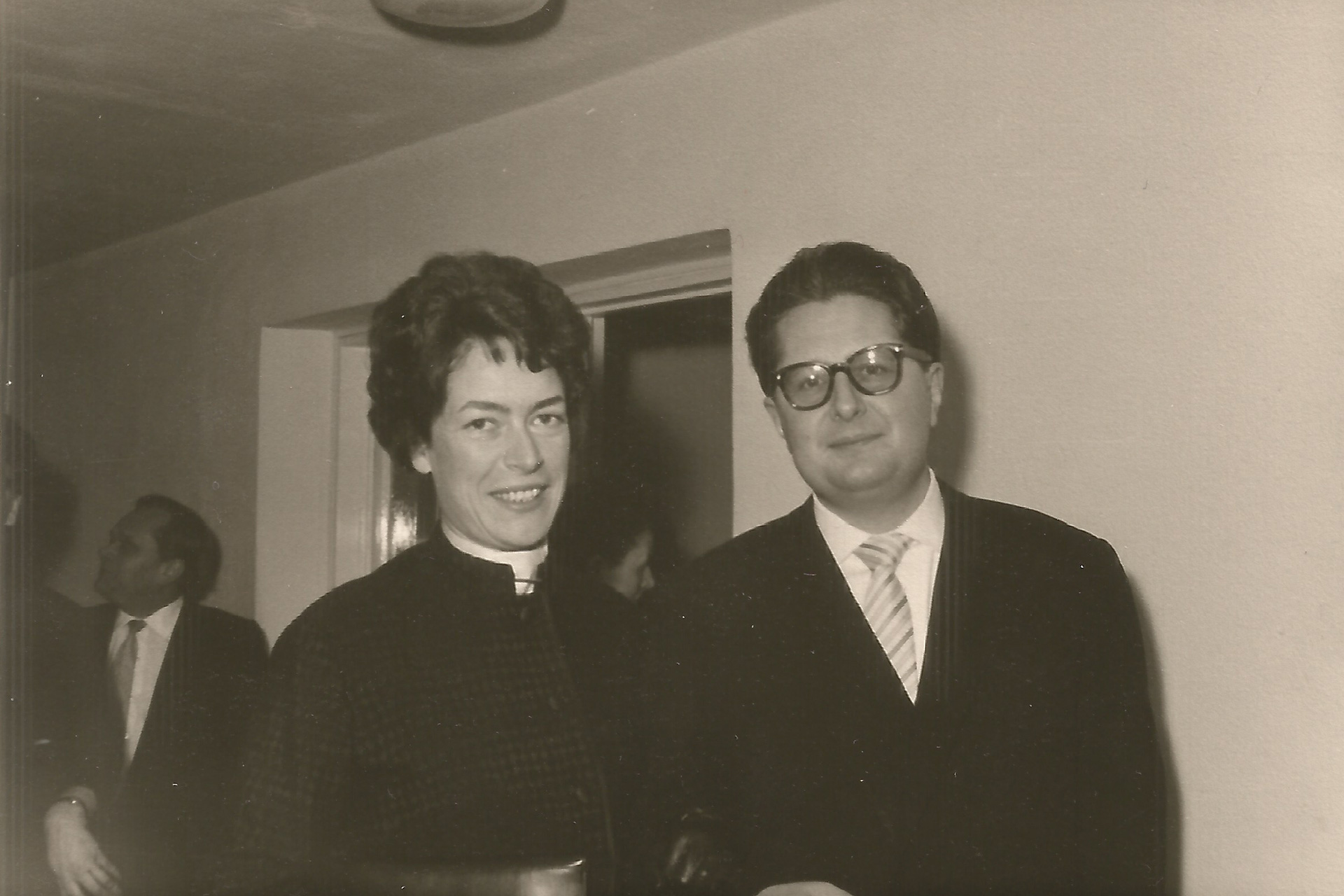
Dr. Hans-Jochen Vogel with his wife at the memorial unveiling ceremony.
The speech by Dr. Hans-Jochen Vogel is still relevant today. The student dormitory was intended to be a place of remembrance and a warning for the future. Therefore, the association decided to erect a memorial for the murdered Scholl siblings and announced a competition for it. The design by sculptor Christine Stadler was awarded and brought to life. The memorial is among the most recognized works of the artist. It was financed through a donation of 1,500 DM from the IG Metall Bayern.
During the unveiling of the memorial on February 17, 1962, the historian and member of the association, Prof. Dr. Alexander Schenk Graf von Stauffenberg, brother of Claus von Stauffenberg, spoke, among other things, the following:
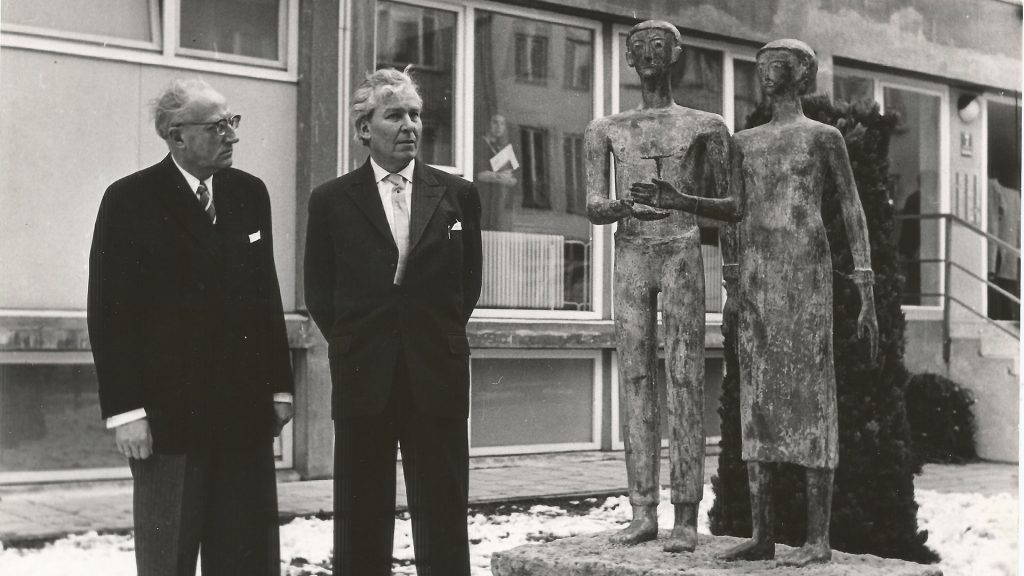
At the memorial (from left): Association Chairman Prof. Dr. Marchionini (left) and Prof. Dr. Alexander Graf von Stauffenberg.
„The real secret of their sacrifice and their heavy and proud deaths, 19 years ago today, seems to have been the meaning of their severe and self-chosen path imposed upon them in the bloom of their youth. This meaning, expressed in one word, is “expiation”: that they, unlike the thousands and tens of thousands of us who, through timidity and cowardice, through tolerance and passivity, were also involved in the disaster, cleansed the tainted earth and restored the lost self-respect for us others.“
A lot of prominent figures attended the hall for the unveiling celebration of the memorial. The chairman of the association, Prof. Dr. Alfred Marchionini, welcomed Dr. Wilhelm Hoegner, Munich’s Mayor Dr. Hans-Jochen Vogel, Robert Scholl, and Erwin Essl representing the IG Metall.
Alongside the association’s chairman, Prof. Dr. Alfred Marchionini, the executive director of the association, Dr. Hans-Jochen Vogel, was another driving force in the establishment of the association, fundraising efforts, and the construction of House 1. In 1960, at just 34 years old, he was elected Mayor of the Bavarian capital, Munich.
Picture gallery from the unveiling ceremony of the memorial of the Scholl siblings by Christine Stadler on February 17, 1962.
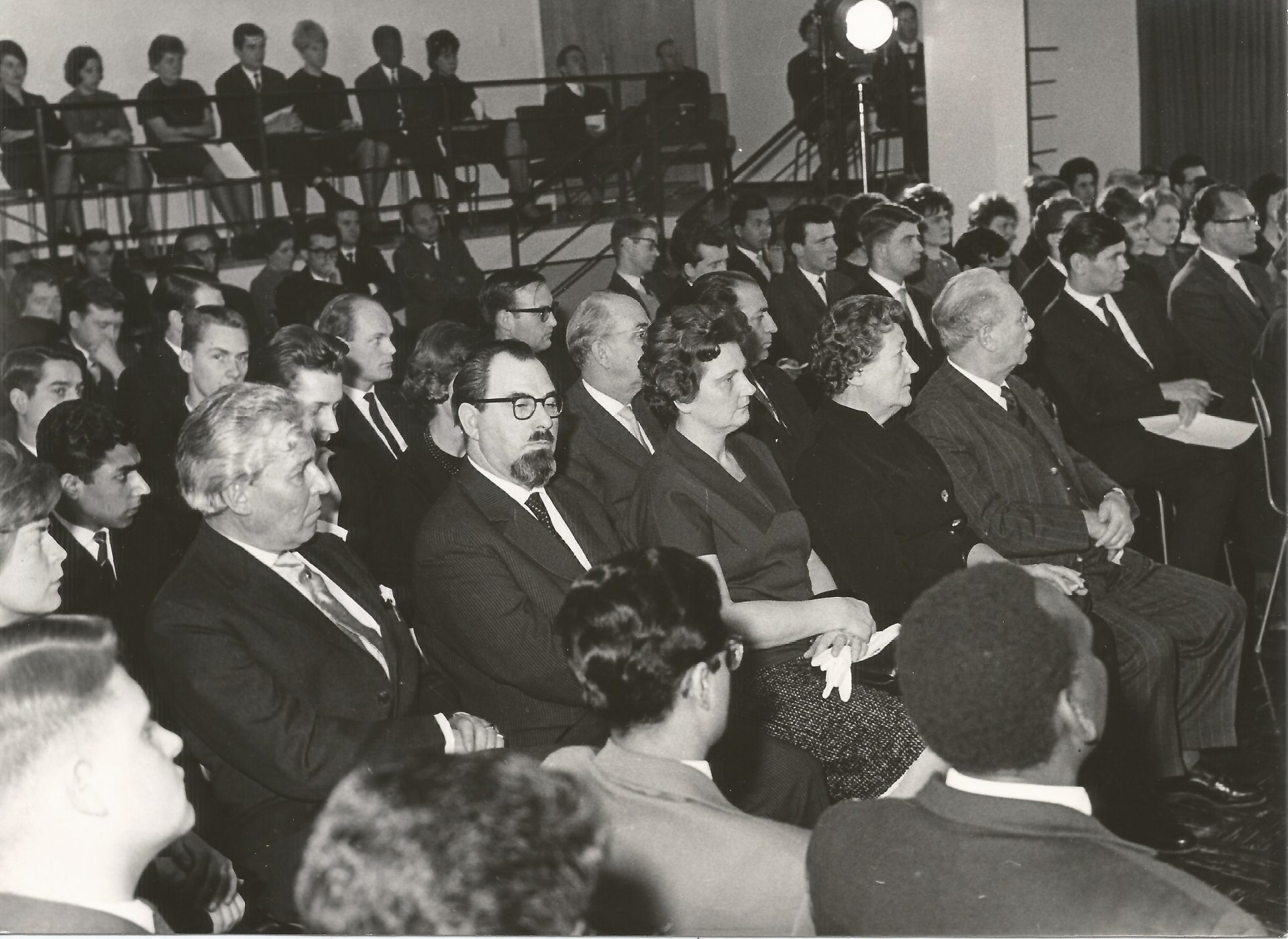
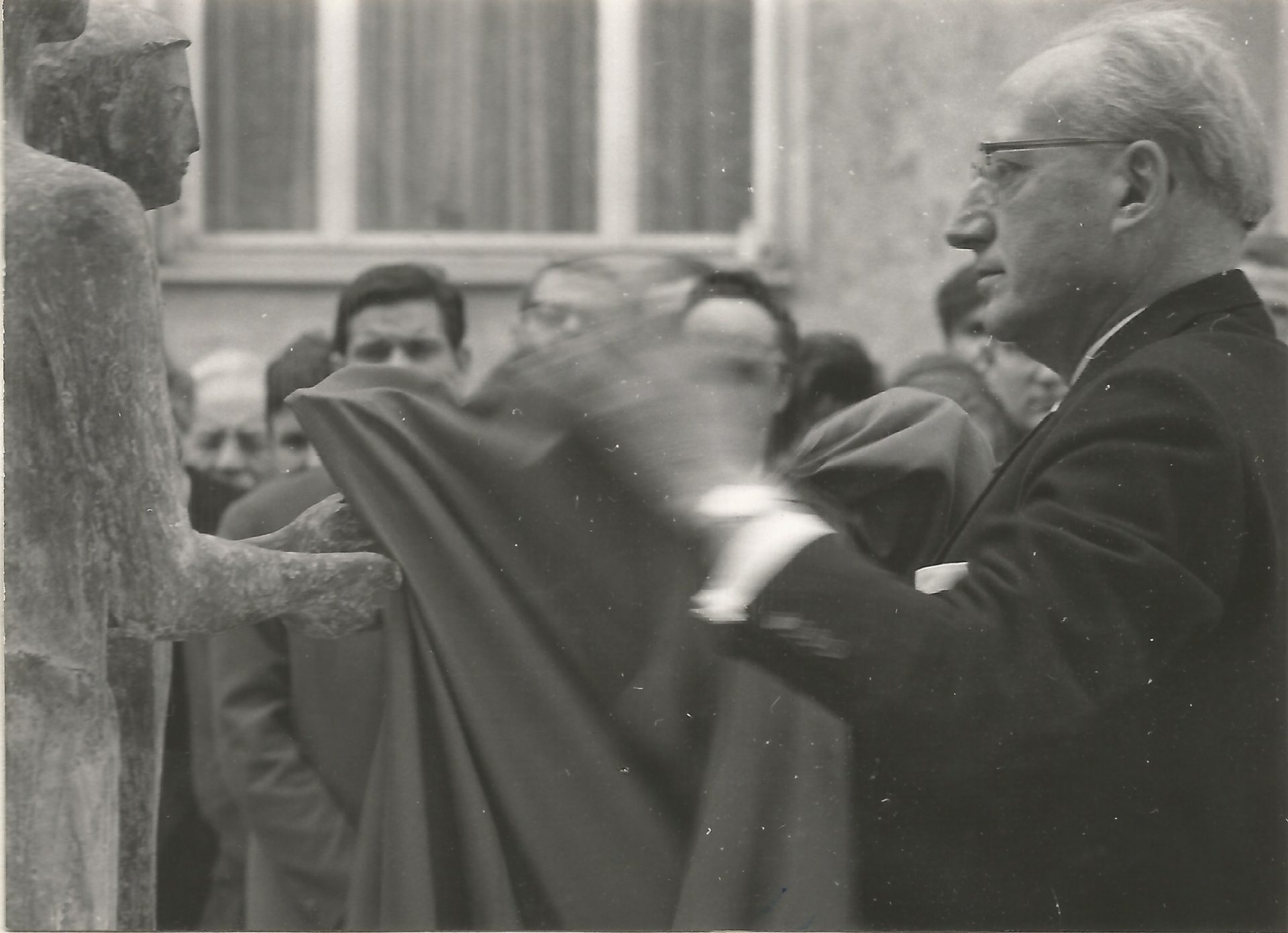
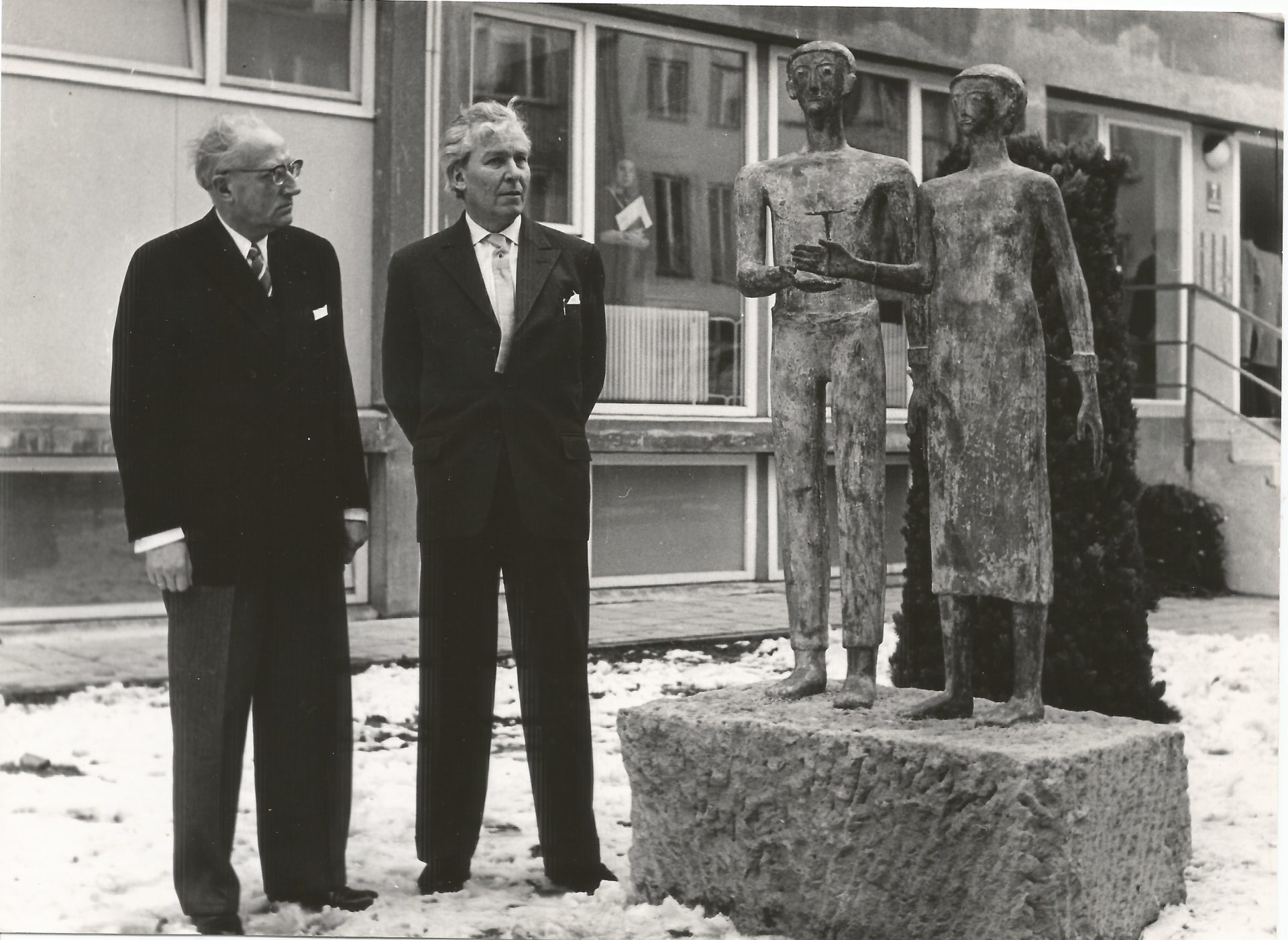
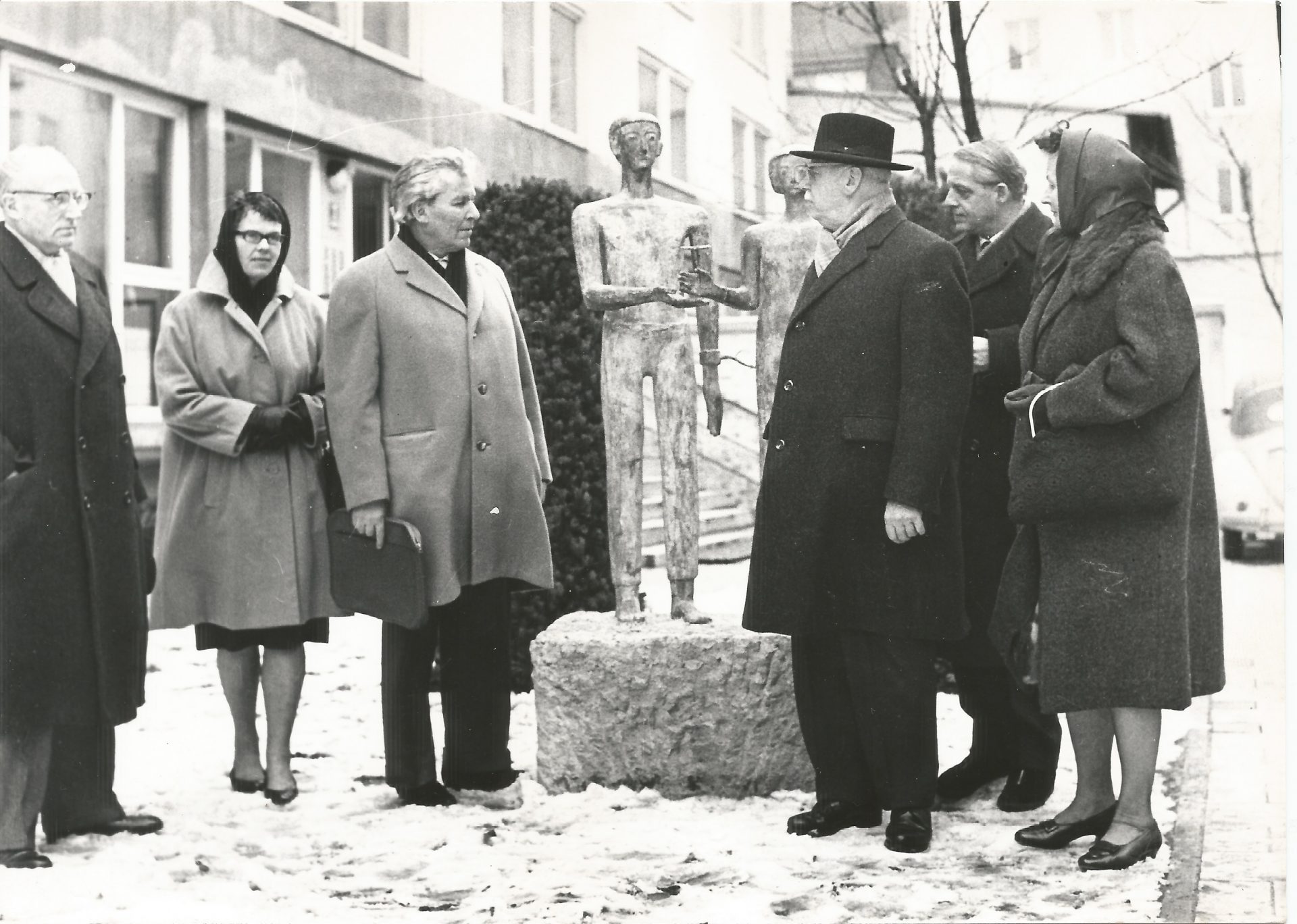
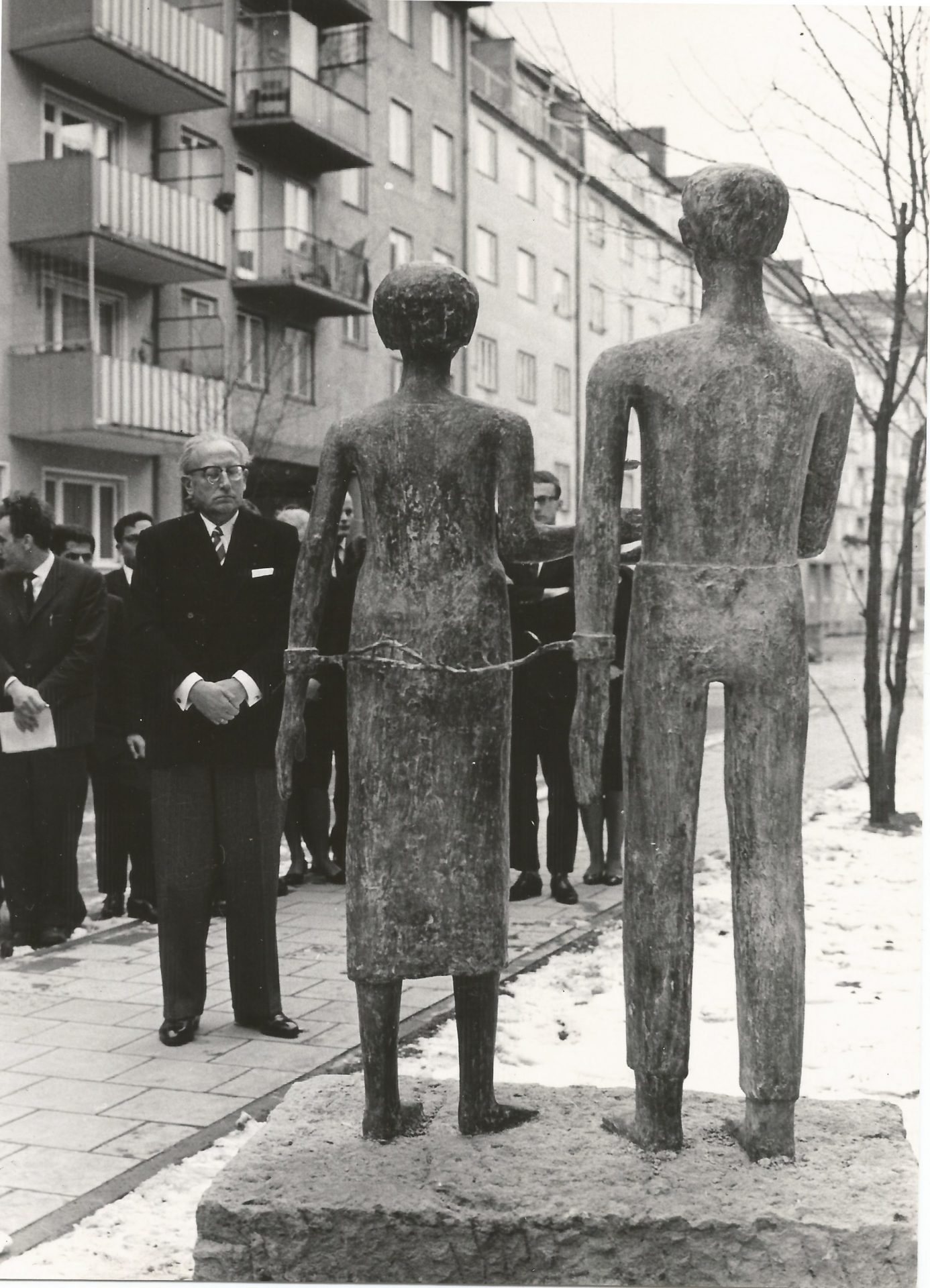
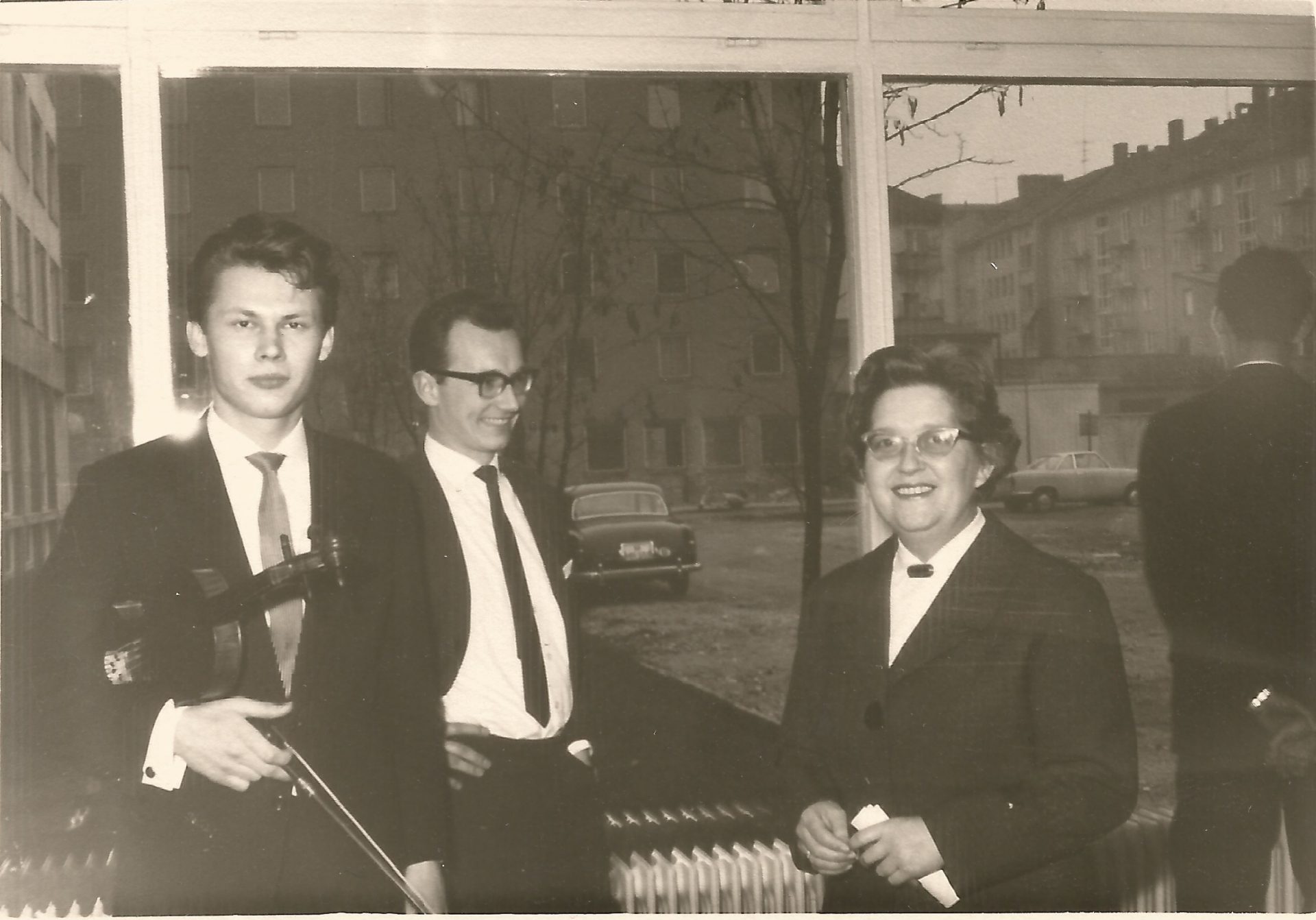
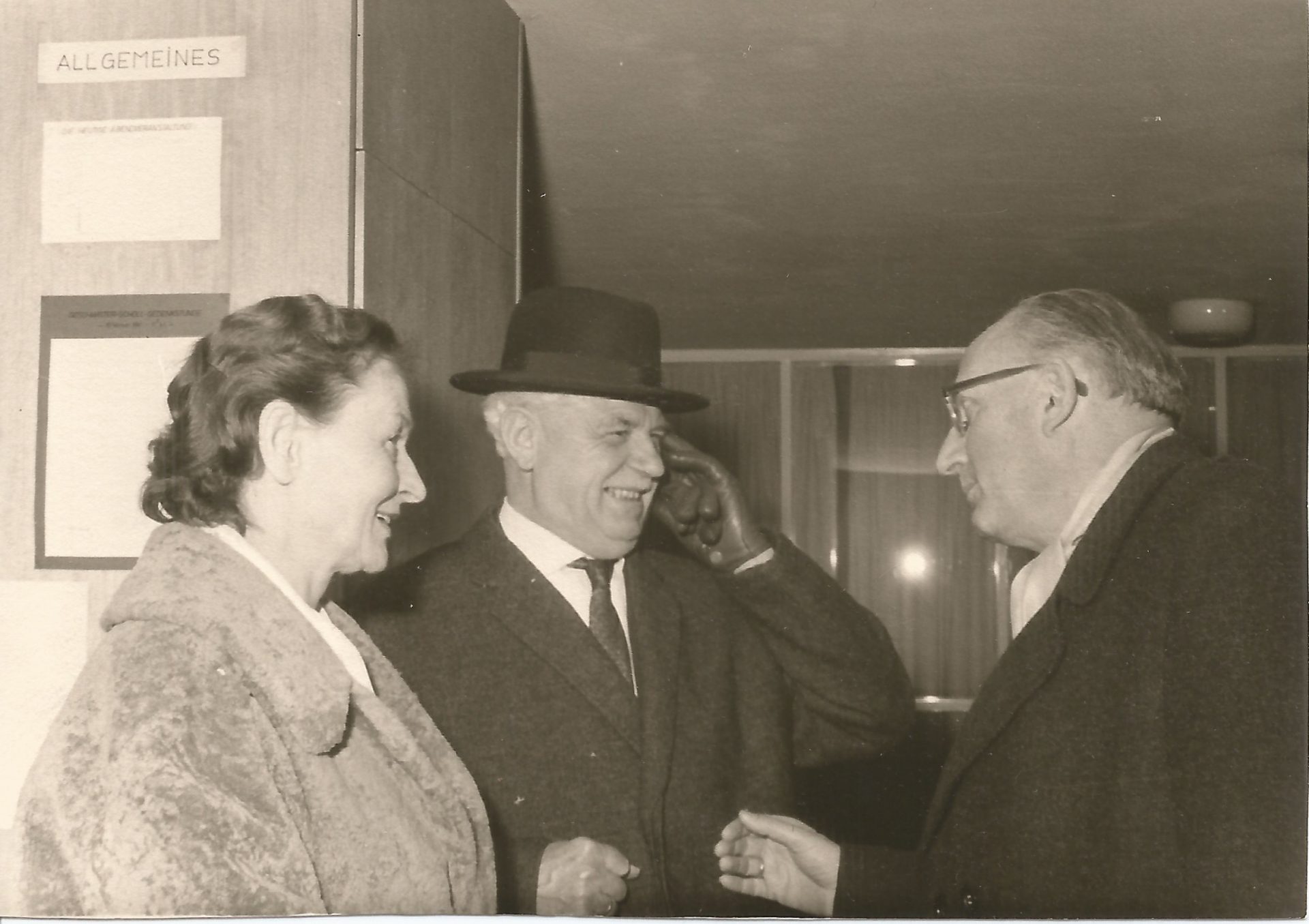
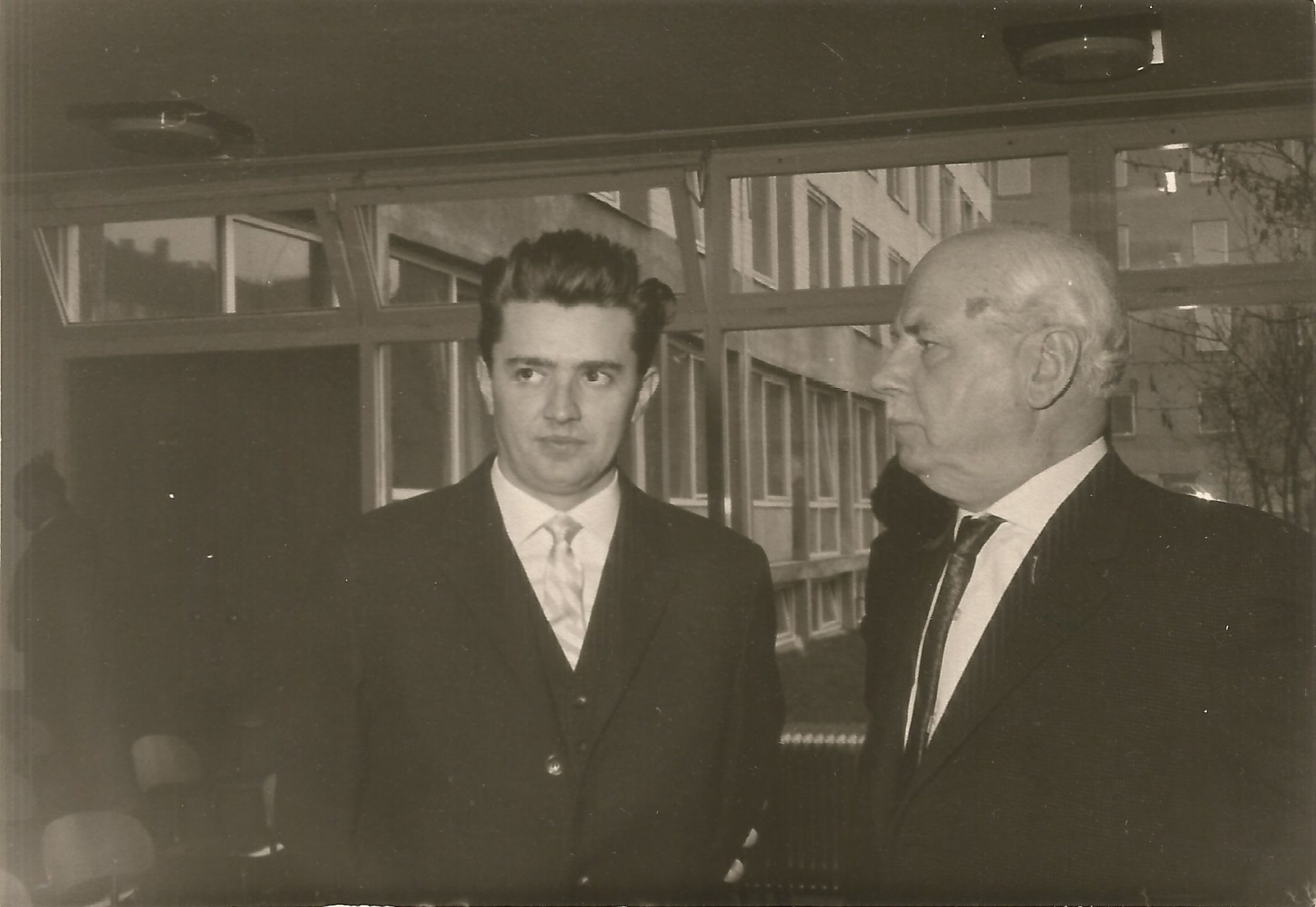
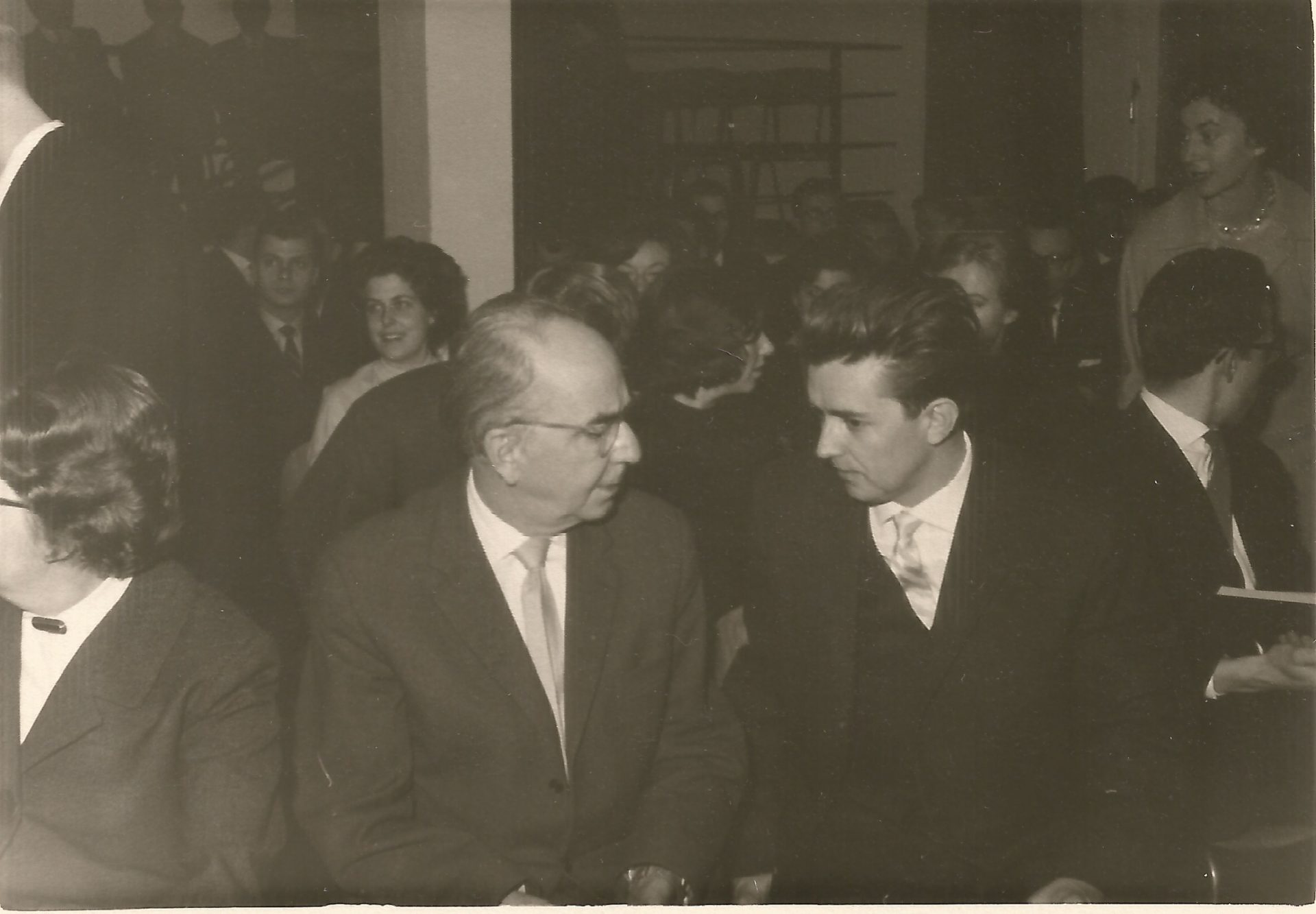
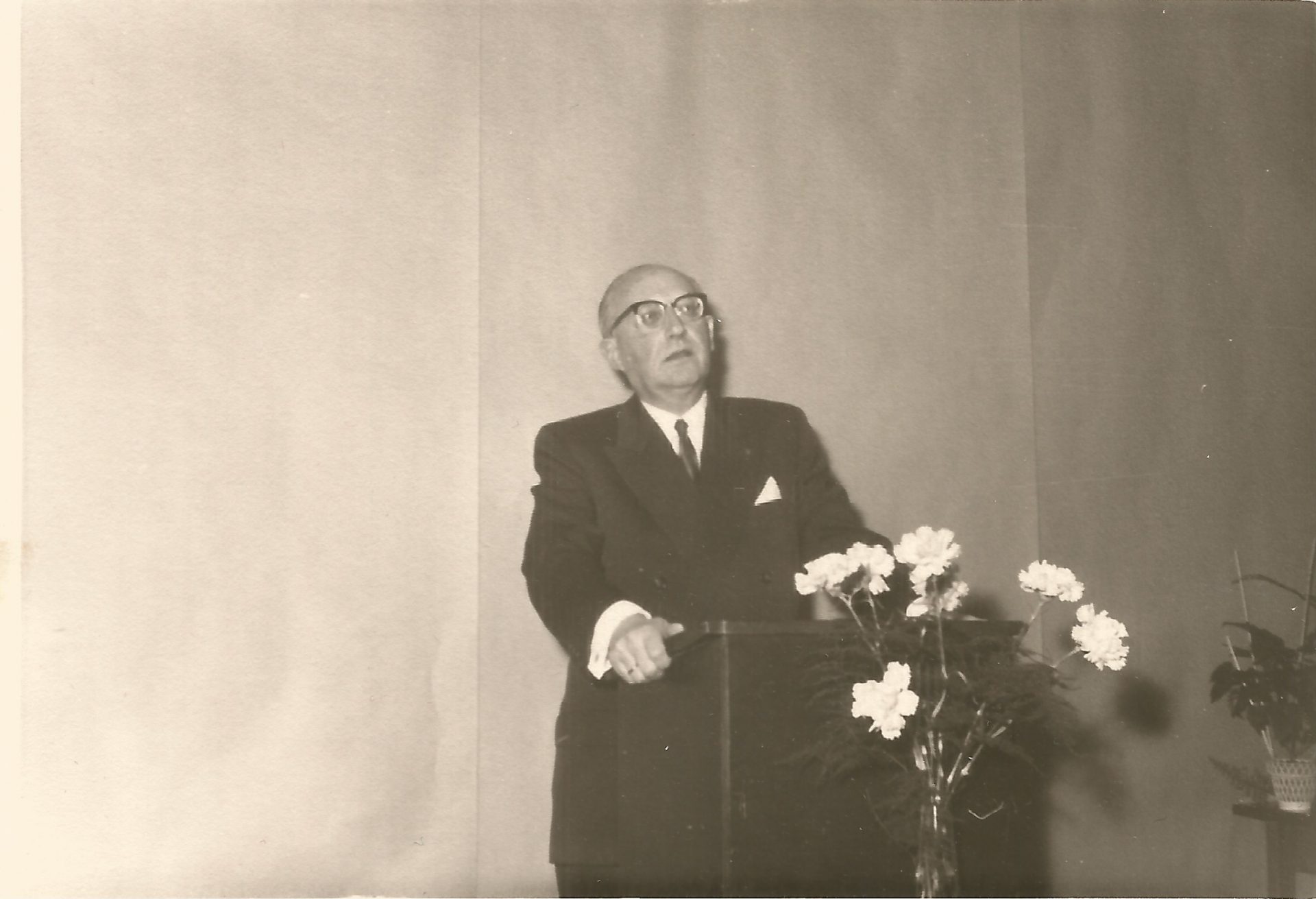
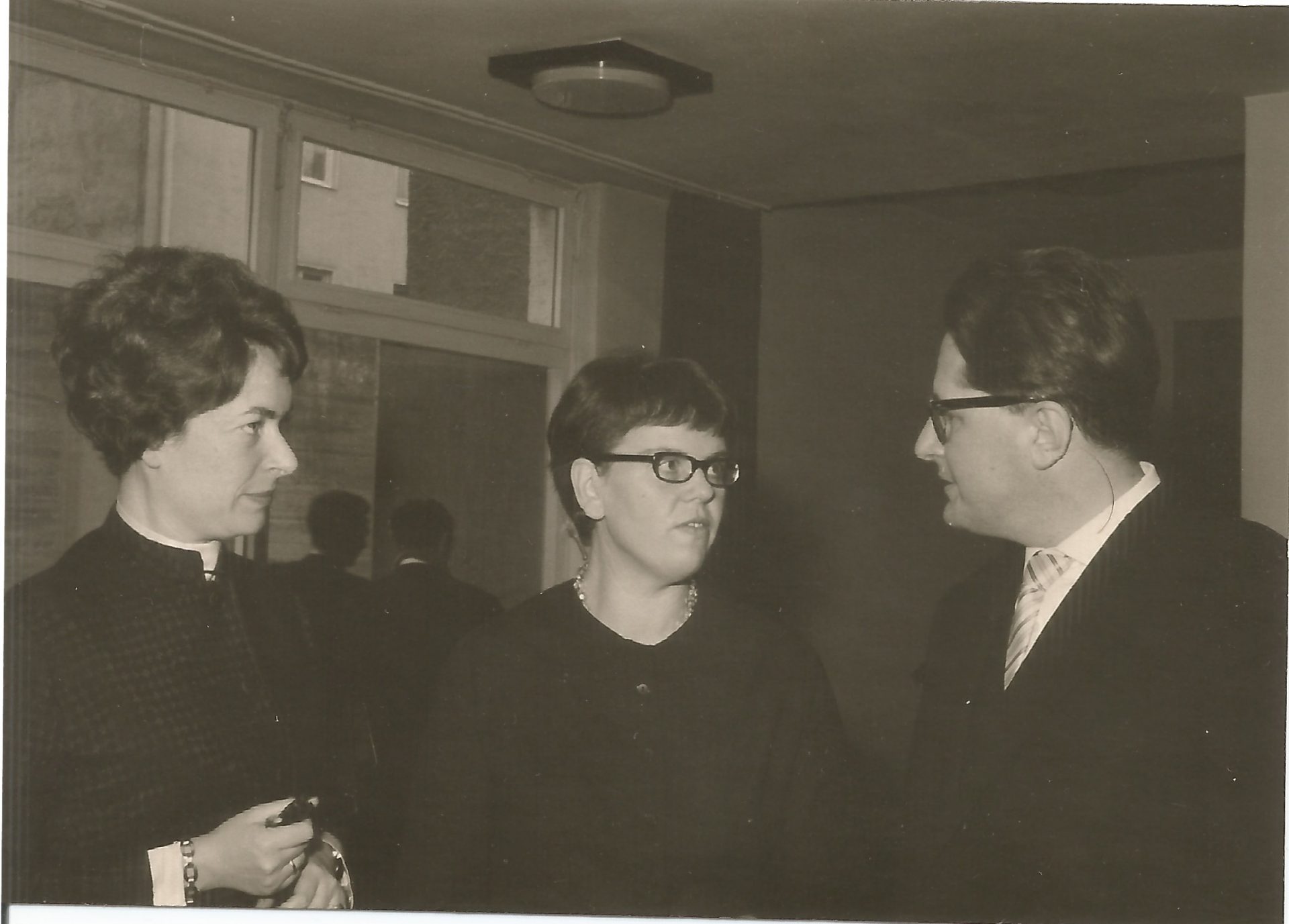
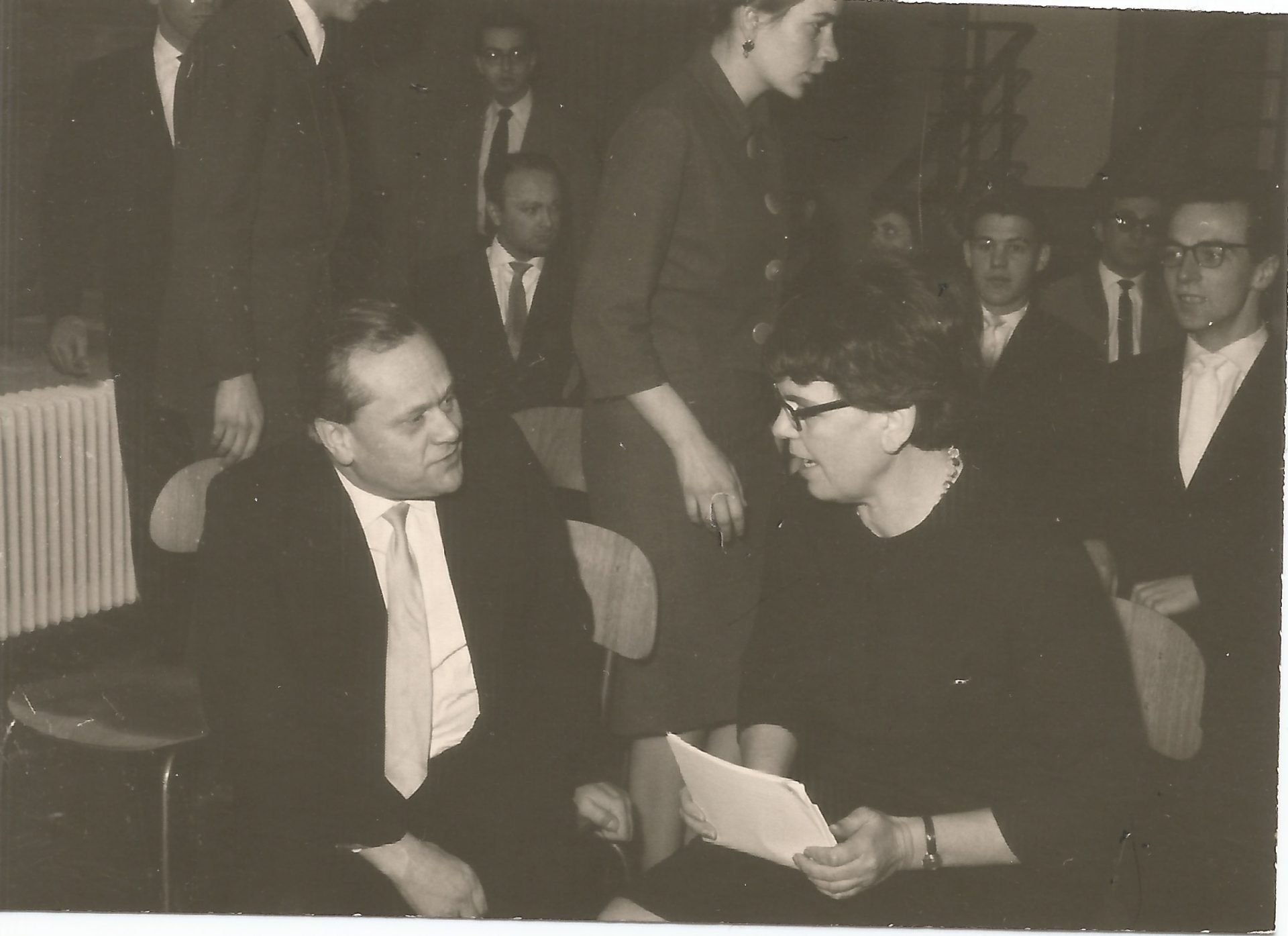
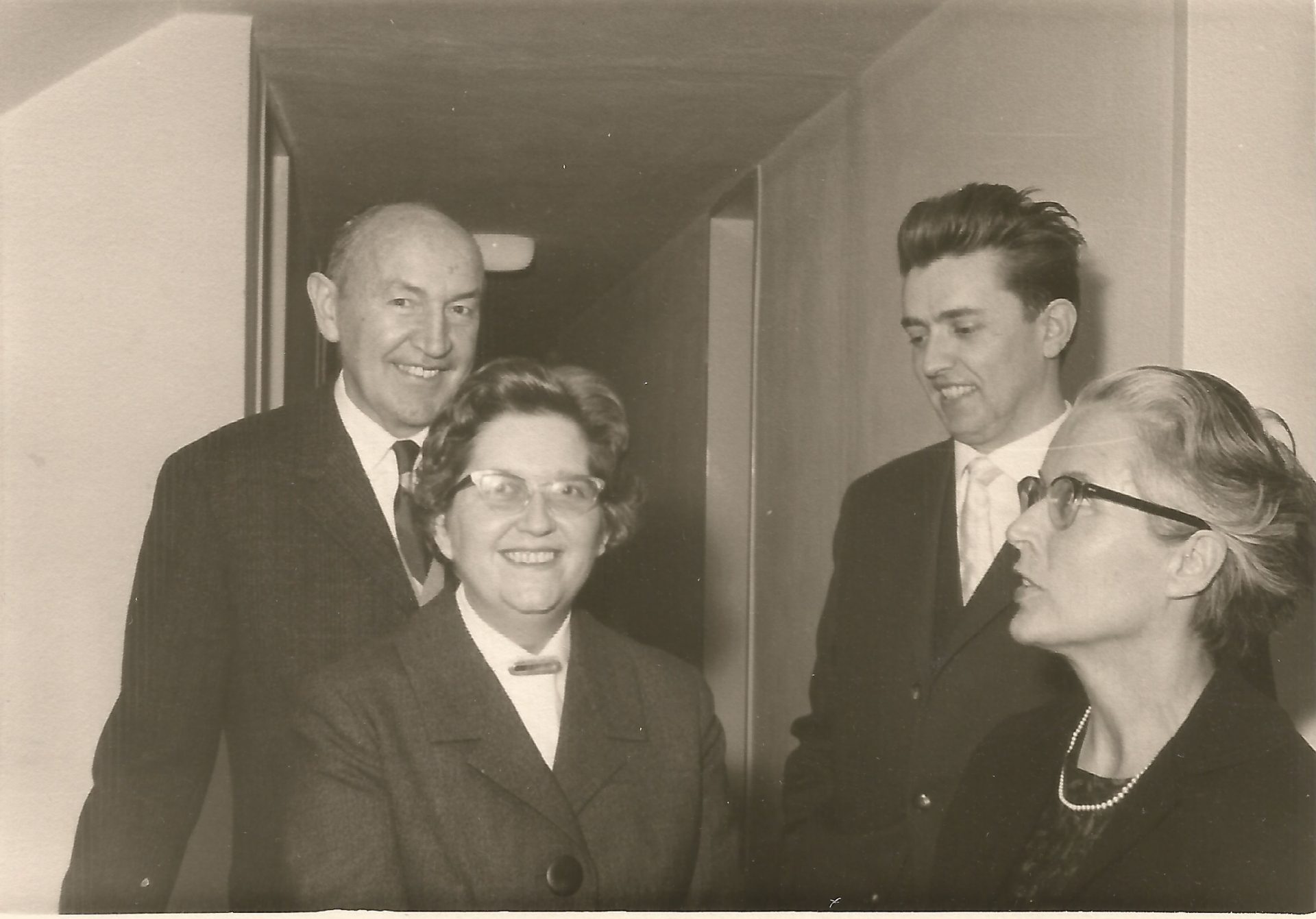
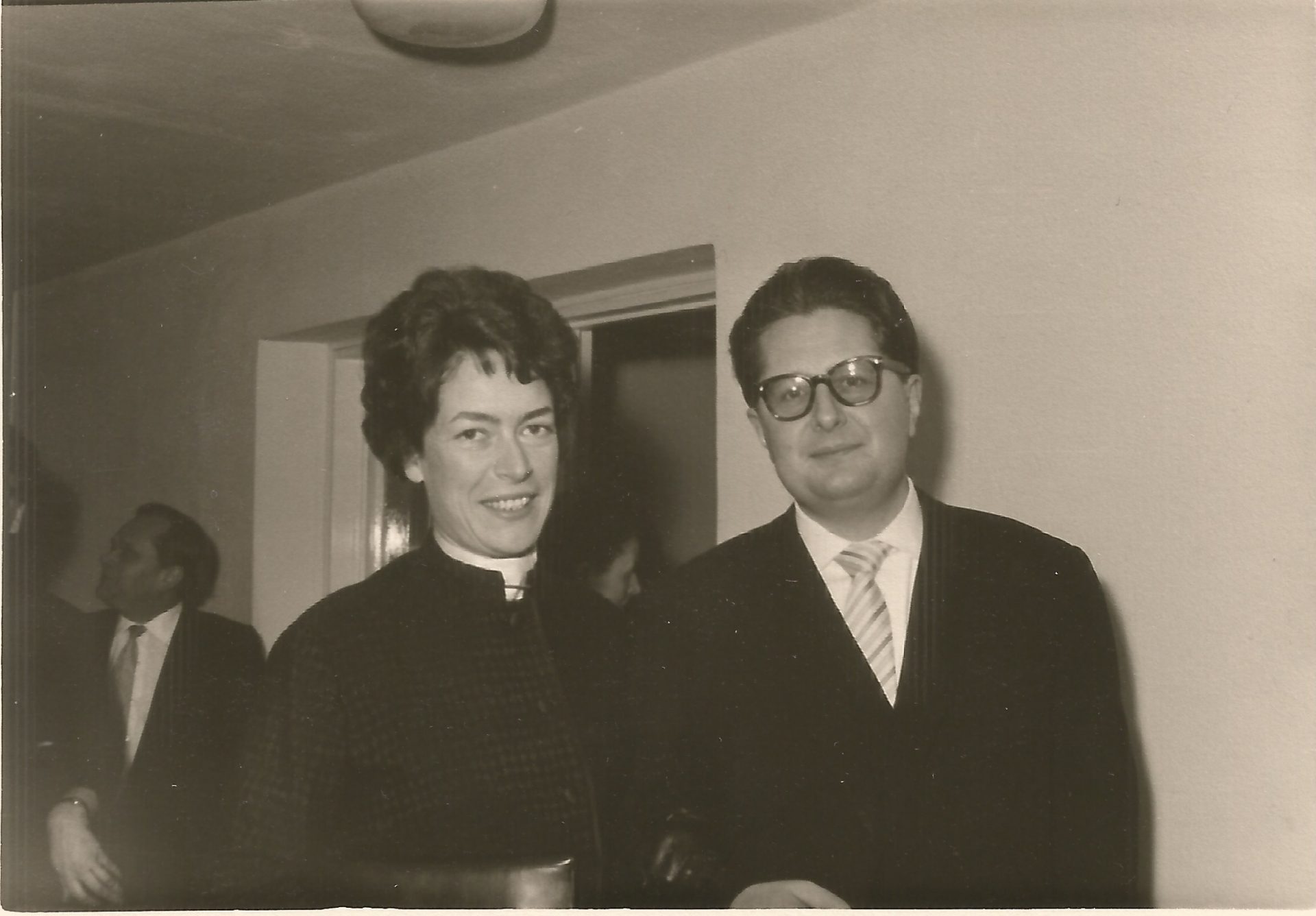
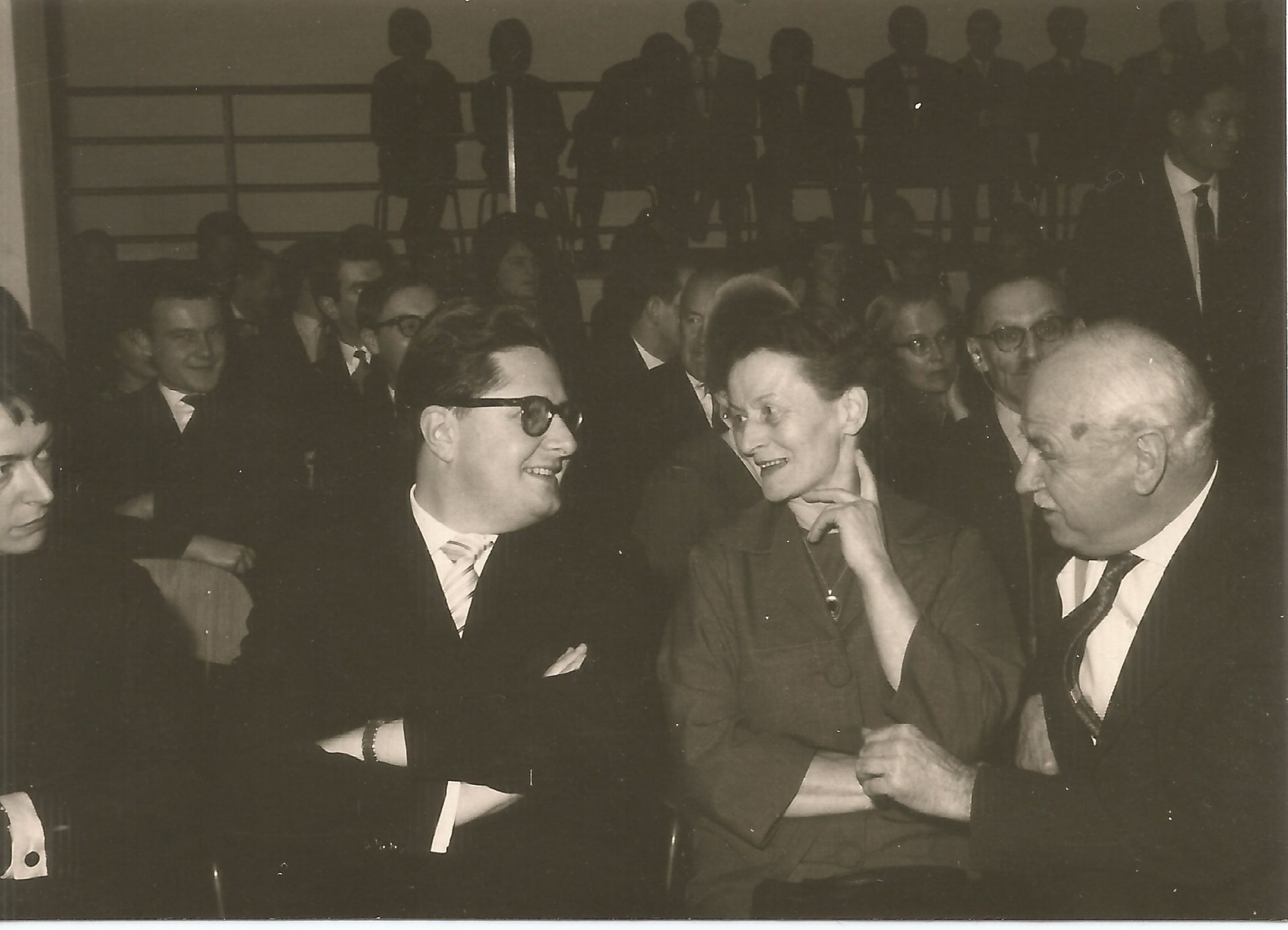

Management under Robert Jenisch (1960 to 2016)
below: Picture gallery of the Chairmen of the Association
Since Dr. Vogel was unable to continue leading the association, the organization needed to find someone new for the role. The spotlight fell on Robert Jenisch, a legal professional who, as a young member of the SDS, had been involved with the association since its inception. During the founding period, he played a significant role in preparing for the construction of House 1 and had long been actively supporting the management. In December 1960, he was elected by the general assembly to succeed Vogel as the association’s executive director. Immediately, he began fundraising for House 2, along with its planning and execution. Just four years after the opening of the Geschwister Scholl Student Residence with House 1, the extension on the neighboring ruin site, featuring 98 additional rooms, was occupied at the beginning of 1964.
The association’s chairman, Prof. Dr. Alfred Marchionini, witnessed the completion of House 2 but unfortunately didn’t have the opportunity to enjoy the successes of the association for long. He passed away on April 6, 1965, at the young age of 66.
The association’s assembly elected the biochemist Feodor Lynen as his successor, at the time the director of the Max Planck Institute for Cell Chemistry in Martinsried near Munich. It’s admirable that the Nobel laureate in Medicine, among his numerous other honorary positions and memberships in scientific committees and societies, also took on this responsibility. He passed away on August 6, 1979, at the age of 68.
After him, the physicist Edgar Lüscher, Professor of Experimental Physics at the TUM, assumed the chairmanship of the association. Despite being heavily occupied with his research in the field of solid-state physics and establishing the physics department in Garching, he managed to allocate the necessary time to fulfill the duties of the association. Unfortunately, Professor Lüscher did not live to an advanced age; he passed away on January 16, 1990, at the age of 64.
As the successor to Professor Lüscher in the chairmanship of the association, the organization managed to persuade the renowned dermatologist Professor Dr. med. Dr. phil. Siegfried Borelli. He held the position of Professor Emeritus and Director of the Clinic and Polyclinic for Dermatology and Allergology at the TUM and served as Medical Director of the Clinic for Dermatology and Allergology in Davos (Alexanderhausklinik). Professor Borelli, a former student and medical collaborator of Professor Marchionini, considered it his duty from the outset to dedicate himself with great commitment to the work of his academic mentor.
Robert Jenisch, in addition to his involvement in the founding of the association and the construction of Houses 1 and 2, also significantly contributed to the construction of the third phase, “House 3”. This phase consists of apartments and was ready for occupancy in October 2019. The approvals for the construction and financial planning took place during his lifetime. Unfortunately, he did not live to see the completion of House 3, as he passed away in October 2016 at the age of 85, after 56 years of voluntary management of the association. Like no other, he devoted energy and passion to the success of his student home, fought for it, and lived for it.
The inauguration of House 3 and upcoming renovations (2016 – present)
Photo gallery of the managing directors of the association
After Robert Jenisch’s passing, there was an immediate need to elect a new managing director to oversee the future of House 3 construction. Although Jenisch’s death was unexpected, he had already prepared a successor for his responsibilities. Therefore, the board of directors appointed Thomas Knappstein as his successor in the management position. Jenisch had known Knappstein from their collaboration at the construction professional association; he had suggested Knappstein’s election as a board member in 2012. These were favorable conditions for Knappstein to step into the role, managing the ongoing affairs of the association alongside the supervision of House 3 construction and preparations for planned renovations of Houses 1 and 2. Upon the completion of House 3 construction, due to his demanding role as a leader in the professional association, Thomas Knappstein resigned from his position as managing director in March.
The board appointed Friedrich Graffe, the vice chairman of the association, as his interim successor. He already serves as the managing director of the Alfred and Karl Marchionini Foundation.
The long-serving association chairman, Prof. Dr. Dr. Siegfried Borelli, due to age-related reasons, stepped down as the chairman of the board at the end of the general meeting in January 2020. Recognizing his merits for the residence and the association, the general meeting unanimously decided to propose honorary chairmanship of the association to Prof. Borelli.
The new chairman of the association elected was the historian and media scientist, Prof. Dr. Peter von Rüden. He previously held positions as the director of the Adolf-Grimme-Institut, head of the education and culture department at NDR Television, and led the research department for broadcasting history at the Leibnitz Institute for Media Research and the University of Hamburg’s Institute for Modern German Literature and Media Culture. Between 1969 and 1972, he served as a tutor at the Geschwister Scholl student residence and has been a board member since 2017.
60 Years of Schollheim and Inauguration Ceremony of House 3: Memories for the Future (2020)
We, as a collective of the association and residents of the dormitory, take pride in the continuous story of our association, and consequently, that of the dormitory itself. During the commemoration of the 60 years of Schollheim and the official inauguration of House 3, discussions revolved around its future. Building upon the history of Schollheim, Munich’s Mayor, Dieter Reiter, the inaugural managing director of our association, Dr. Hans-Jochen Vogel, and our association’s chairman, Prof. Dr. Peter von Rüden, articulated thoughts and aspirations for the future.
Prof. Dr. von Rüden recapitulated the history of our association and articulated the following thoughts regarding the present:
„Personally, the assessment from our first patron, Wilhelm Hoegner, on the failure of the democrats before the end of the Weimar Republic in the book “Flucht vor Hitler: Erinnerungen an die Kapitulation der ersten deutschen Republik 1933” is of great relevance to me. It describes the internal, gradual dissolution of a democracy. To put it succinctly: Hoegner provides evidence that those who are dormant in democracy awaken in dictatorship.“
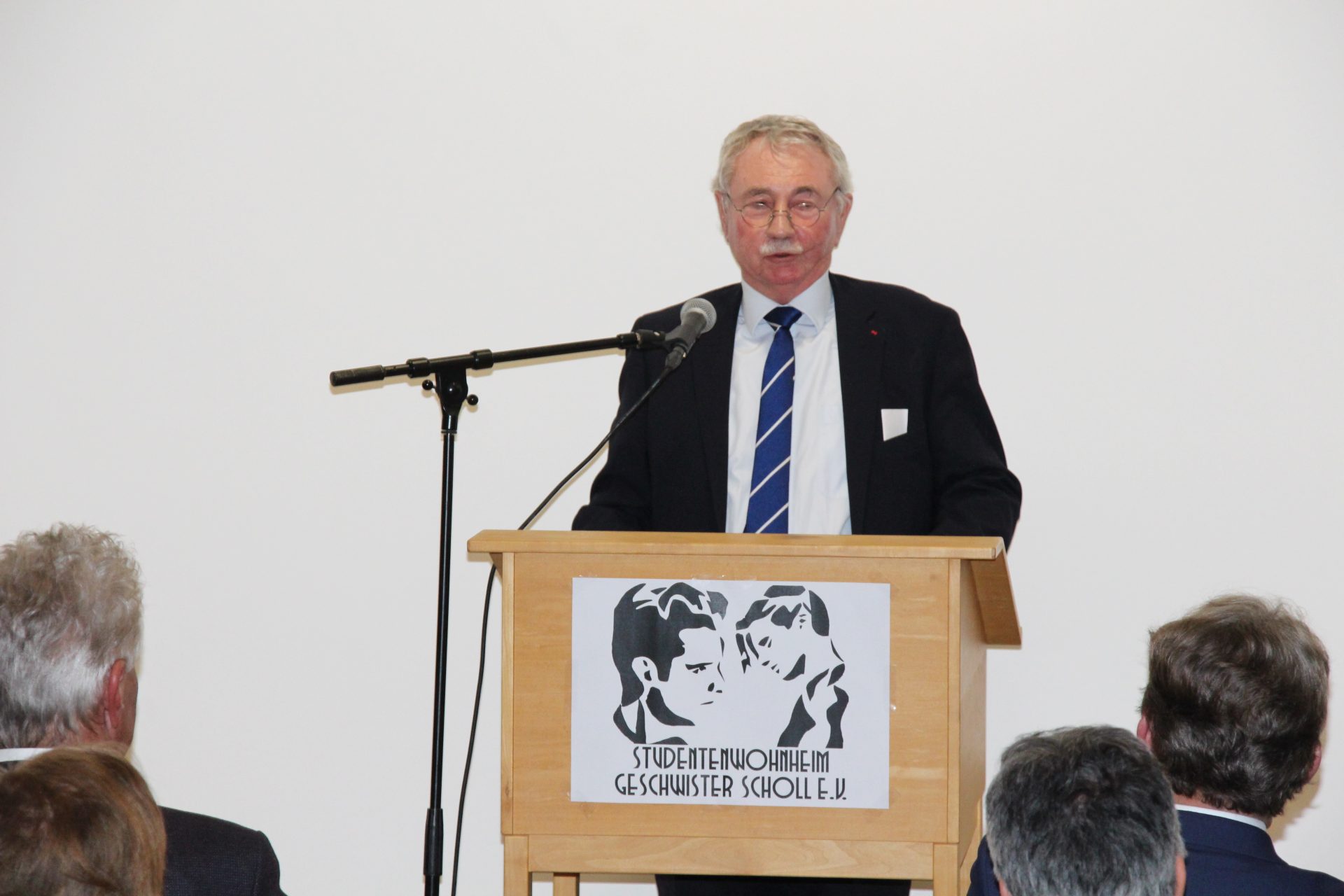
Professor Dr. von Rüden during his speech for the 60th anniversary celebration
To the Scholl siblings, Dr. Hans-Jochen Vogel recalled in his speech, appealing:
„Even more important [than international acquaintanceship] was another contact for all these residents – that with the Scholl siblings, whose names they encountered daily. They were in constant contact with two individuals who, in a not entirely easy process, recognized the criminal nature of the regime at that time, called for resistance against it, and ultimately sacrificed their lives for it. Individuals who aspired to a societal order based on values, offering freedom to people and aspiring for peace.
Therefore, the remembrance of Hans and Sophie Scholl is also a call to decisively counter the attacks on these values and our democracy, which, at present, are certainly not lacking.“
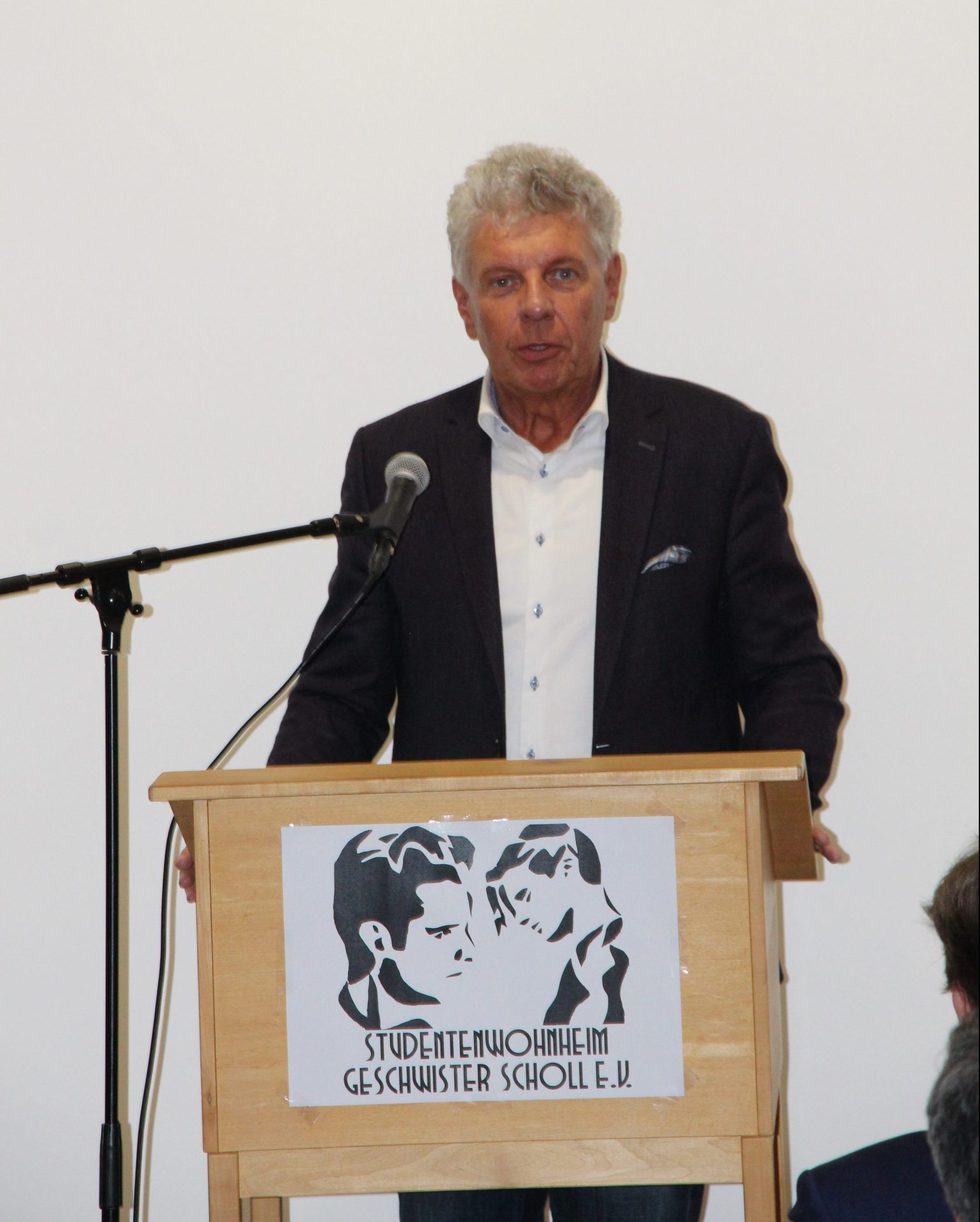
Mayor Dieter Reiter during his speech for the 60th anniversary celebration. während seiner Reder zum 60-jährigen Jubiläum
Mayor Dieter Reiter emphasized in his ceremonial speech the connection of all Munich mayors with the student dormitory bearing the name of the Scholl siblings. The need to combat racism, discrimination, and antisemitism has once again become relevant. These are developments that, although still manageable in Munich, as Reiter stated, “We never want to see this again in our city.”
With Dieter Reiter’s speech, the arc of support for the Studentenwohnheim Geschwister Scholl e.V. spans from the first Munich mayor after World War II, Thomas Wimmer, to the current one. This underscores that our student dormitory is not just one among many, but rather a unique feature of Munich. To continue being so, and to honor our founding ideals and namesakes in the future, it is essential for us to be more than just an ordinary student dormitory: a place for debating politics, contemporary history, literature, and art.

